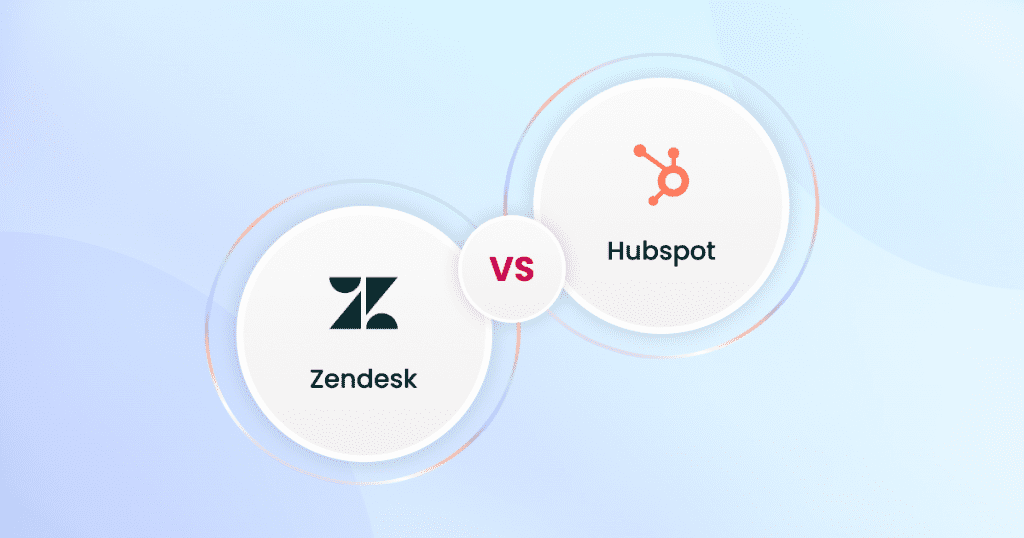Business thrives on customers, and customers thrive on relationships with them. An efficient CRM can contribute significantly to achieving this goal. Considering customer relationship software, you can’t miss the two Saas giants paving their way to provide customer-centric solutions to any enterprise. Hubspot and Zendesk rank the highest in the category of CRM software in 2023, with a few rivals tightly following.
Needless to say, both platforms cater to the organization’s unique needs. Opting for either of them may seem identical at first, but later on, the proficiency of one may outweigh the expertise of the other.
Before considering any service, it is always wise to evaluate your business needs and suitability first to optimize the redundancy and maximize the profitability of your organization. The second thing to prioritize is the end users of the platform.
The less resistance they face in using particular software, the more agile they get in dealing with the customers, bragging about better customer experience, increased productivity of the team, and more money in their basket.
The next phase comes with the assessment of the product or service. Though both the CRM services and solutions aim at aligning the customers with the business entity, both of them come with unique features and pricing guidelines.
Sometimes, studying both service giants may offer a better understanding of the product, but their hefty packages may lead you to a budding enterprise offering the same service at a considerate price range.
Let’s have a quick look at what Zendesk and Hubspot have placed in their service basket.

Key Takeaway :
When comparing Zendesk and HubSpot for customer support, it’s essential to consider your business’s unique needs and the end users’ experience with the platform. Both offer unique features and pricing guidelines, so evaluating them based on your specific requirements is crucial for maximizing profitability and minimizing redundancy. Additionally, the user-friendly interfaces, multichannel support, and integration capabilities of each platform should be carefully assessed to determine which one best suits your organization’s customer relationship management needs.
Hubspot Sales Hub vs Zendesk Sell: An overview
Driven by the mission to simplify connections, the Zendesk suite aims to provide customer-centric services and sales productivity solutions. It is a cloud-based SaaS, i.e., software as a service company. It caters to the needs of mid-size to macro-size business enterprises.
Its customer relationship management software enhances the customer’s conversational experience through Zendesk’s common interface, whereas the sales productivity solution helps in quantifying the sales leads and consumer data through a common dashboard, making the lives of service teams easy – we’d give 9/10 for the ease of use.
Both these products come with impressive dashboards, user-friendly interfaces, and data-driven tools to gain insights and increase productivity. Are you looking for software to gain insights into marketing and increase sales volume? Hubspot service Hub is at the doorstep. Hubspot provides tools and programs to minimize the efforts of your team and maximize the outputs.
Also read: Intercom vs Zendesk – A Comprehensive Comparison of Support Solutions
The software empowers the sales personnel to connect directly with the website visitors, enabling them to solve their queries, sometimes assisting in filling out the forms, and thus converting the prospective visits into the right deal. CRM tools are handy for the users to record the client information, conversation, and engagement history to gain insights into the customer’s buying behaviour.
It enables sales personnel to multi-task through multiple channels automate and accelerate the sales process. Logging customer queries, integrating customer details, and email campaigning are a few examples.
What is Hubspot Service Hub?
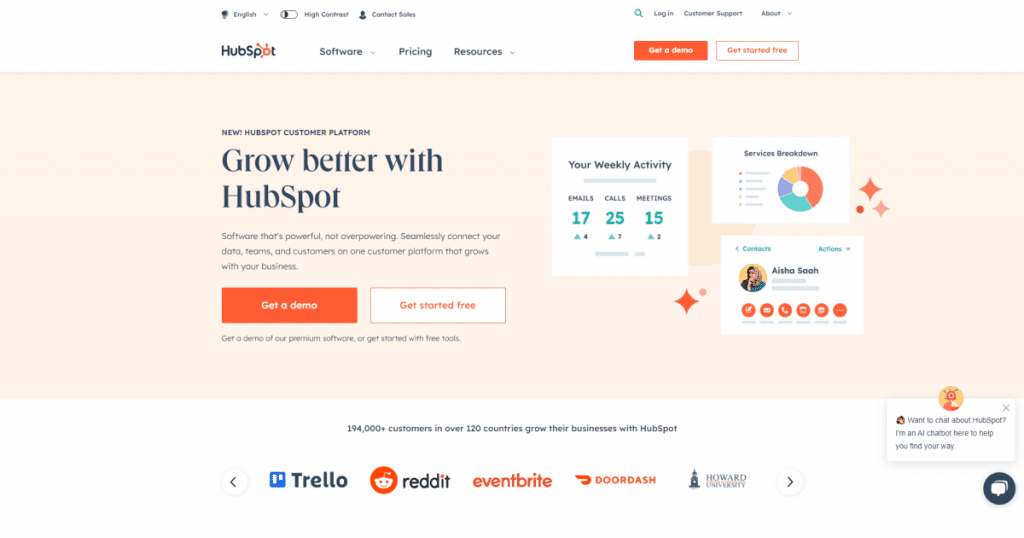
Before comparing Hubspot service hub vs Zendesk, you first need to understand what is this software all about, and then we;ll figure out whether it’s better than Zendesk support for customer service teams or not.
Hubspot CRM, quite unfamiliar to the segment, is the fastest-growing Cloud-based sales service platform. The software is very instrumental in accessing and managing the customer’s files, organizing and automating the workflow pattern of the sales team, and boosting the customer experience.
Founded in May 2018, Hubspot Service Hub has gained momentum in the field and has extended its service to acclaimed businesses such as Accenture, Trello, Samba Tech, Mollie, Gitbook, Trustpilot, and many more. We can’t call it the best CRM out there, but Hub provides enough for the money and adds stars to customer interactions.
What is Zendesk?
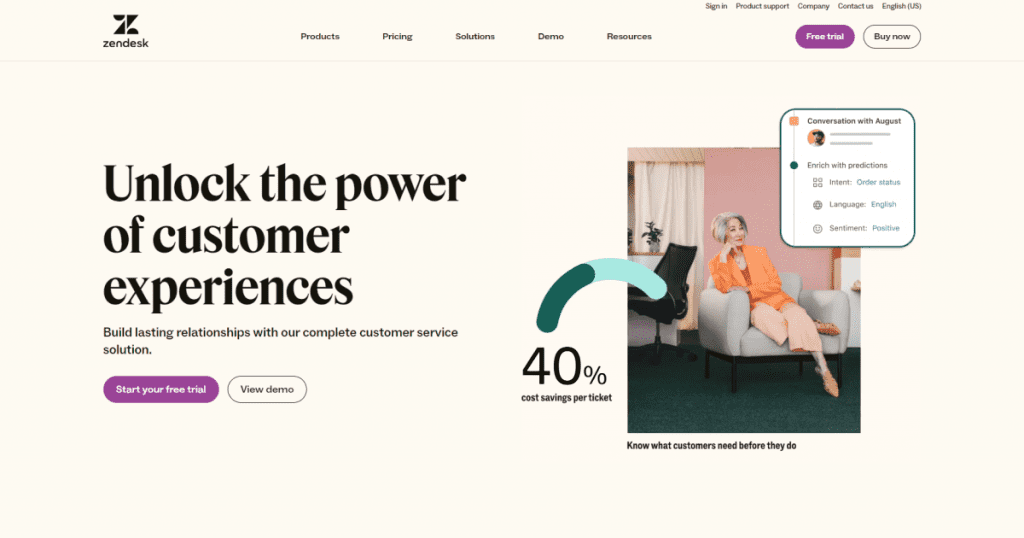
Want to connect with your customers? Then, it’s your time to learn about Zendesk, a tremendous customer service solution that performs better compared to HubSpot on various considerations. Quite popular in the industry, Zendesk stands out as one of the top-notch customer service software providers. Building Connections and creating meaningful conversation is at the heart of Zendesk.
It offers service under 3 heads, namely Zendesk for Service, Zendesk for Sales, and Foundational Support. The multifaceted and dynamic CRM tools quickly engage the visitors and solve their queries in no time, rendering a fulfilling and long–lasting relationship with the businesses.
Who lags in availing of the Zendesk Services? Mailchimp, Shopify, Siemens, Polaris, Instacart, Grubhub, and many others are no exception to it. Zendesk also is the leader of the niche right now in terms of popularity. However, it’s worth checking how it competes with ServiceNow and Gorgias, before buying it.
Desku as an Alternative
While we compare Zendesk and Hubspot, let’s divert our focus to the third service for a while.
Customer support service serves as a boon to the business organizations. But, this boon has a cost attached to it, and looking at the exorbitant prices, many businesses may think twice before investing in it.
Are you one of those who want to optimize the business processes and increase the revenue but are strangled up between the two Service giants? We recommend having a look at the third one.
Desku, a Customer Support service provider company, is paving its way in the emerging market. True to its mission, Desku strives to provide a converging platform to the business to automate repetitive processes, organize workflow patterns, and maximize the end results.
The CRM needs of an organization cannot be neglected. Right from startups to grown-up enterprises, Desku has tailored products to cater to the CRM needs of an organization.
The CRM service provided by Desku competes with the Zendesk suite for its functionality. The live chat experience in Desku mesmerizes the users by creating a flawless conversation between the two entities in no time. The chatbot proves to be at the fingertip in dealing with the web visitors.
Like Hubspot, Desku empowers the employee to multitask from a single dashboard. The Simple and efficient dashboard provided by Desku is user-friendly, accelerates the business process, and regularizes the day-to-day services.
Like Zendesk and Hubspot, Desku stands out for its services and value for money. The Customer support service provided by Desku at this competitive price is noteworthy in all aspects. Desku proves to be a perfect blend of Zendesk and Hubspot for its unmatching services and refined customer experience.
Zendesk Pros and Cons
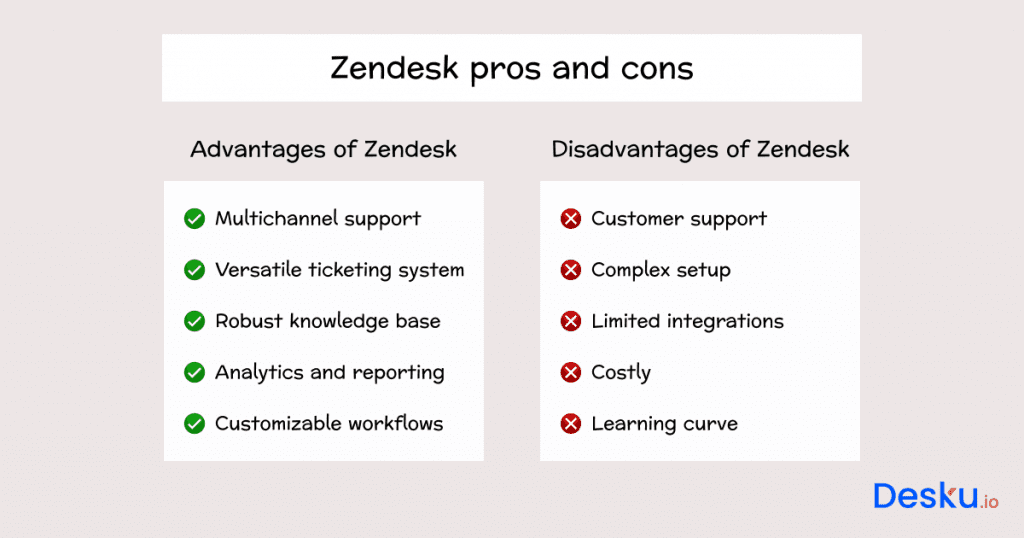
Zendesk Advantages
- Customization and Scalability: Does the same shoe fit in everybody’s foot? The same is the case with the products and services. Customization is needed for today’s industry, and Zendesk serves its customers well by providing tailor-made products per the organizational needs. Zendesk’s ability to cater to all sizes of organizations calls for its scalability.
- Reporting and analytics: Working for hours and having no tools to analyze it? Seems meaningless, doesn’t it? Zendesk provides Reporting and analytical tools to understand consumer needs, gives insights about the working pattern, and eradicates the loopholes in the processes. This data can be used to update the existing services and improve customer experience.
- Robust ticketing system: Zendesk is known for its robust ticketing system. Its ability to route customer queries to the right agents ensures precise and effective management of communication channels. This way, it keeps customer concerns at the core of the entire system.
- User-friendly interface: The simple yet efficient user interface of Zendesk enables both the users and the customers to traverse hassle-free along the medium. This accelerates the processes and user experience.
- Multi-channel Support: Zendesk’s dashboard enables the user to interact with customers through multiple communication channels. Emails, phones, chatbots, and social media tools can be accessed from a single dashboard. This creates ease and streamlines the workflow from a single platform.
Zendesk Disadvantages
- Customer support: Some users have registered concerns with Zendesk’s customer support system for lagging in response time and query redressal mechanism.
- Integration Complexity: The support solutions offered by Zendesk are quite complex to integrate with the business software setup and may require frequent technical assistance to understand and run the software solutions.
- Cost: Nevertheless, the software solutions of Zendesk come with a huge cost, which may not be feasible for every enterprise to spend from their capital balance.
- Limited native CRM: Zendesk does offer CRM technology, but owing to its presence in other segments, the focus on CRM tools may not be as good as that of Hubspot or Salesforce.
- Learning Curve: Though Zendesk claims to have a user-friendly platform, some businesses may find it difficult to integrate with the ongoing business process and experience the learning curve.
Hubspot Pros and Cons
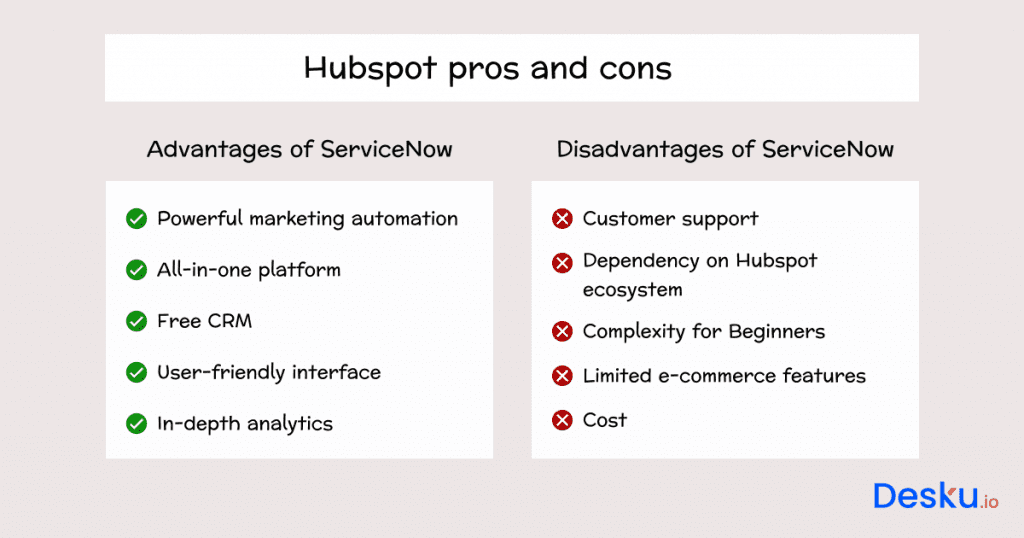
Hubspot Advantages
- Powerful marketing automation: Hubspot is known for its powerful marketing tools, generating the right leads, customizing the customer-friendly marketing experience, processing valuable consumer data, and carving marketing strategies for futuristic goals.
- All-in-one platform: Hubspot’s Sales tools, Marketing tools, and CRM tools can be accessed through a single platform, making the working process more streamlined and customer-centric.
- Free CRM: Yes! You heard it right! Hubspot has free software to enhance your customer relations management system, which includes contact management, email tracking, and lead capture form, making it a lucrative option for any business.
- User-friendly interface: It is a common thing we all look at in any software. Hubspot, too, offers a user-friendly interface to navigate and access all the tools with great ease, thus increasing the team’s efficiency and bringing more productivity to the organization.
- In-depth analytics: Now, this draws relatively good attention. Hubspot’s marketing and sales tools are known for their analytical features, enabling an organization to evaluate and execute data-driven strategies.
Hubspot disadvantages
- Customer support: Some users have experienced a considerable time to resolve their queries with Hubspot’s customer support tools.
- Dependency on Hubspot ecosystem: It is for once and all. Once you enter the Hubspot ecosystem, it becomes difficult to lean on other advantageous tools offered by other platforms as it is closely integrated with your business processes.
- Complexity for Beginners: Hubspot’s wide range of supporting tools may look baffling at first sight. It requires proper understanding and training to use effectively for your organizational needs.
- Limited e-commerce features: Businesses relying on e-commerce strategies for their sales and marketing campaigns may find Hubspot’s tools less functional and operational as compared to its peers completely focused on e-commerce platforms.
- Cost: As a part of its marketing strategy, Hubspot offers free CRM and some free marketing tools. However, businesses in need of a more advanced and complete set of tools may find Hubspot’s tools quite expensive to consider for their operational needs.
Are you feeling confused choosing between these two customer support solutions in terms of pricing? Let us suggest you another awesome option, Desku! This platform has been increasingly getting famous in terms of robust performance while containing all essential features. Most importantly, Desku’s cost-effective plans will impress you.
Difference Between Zendesk vs Hubspot
Content Management
The more concise and organized your content, the clearer and catchy it appears to your visitors. Content management lies at the heart of any online platform to draw visitors and increase engagement time. Hubspot excels far ahead in providing content management services to its users as compared to Zendesk.
Hubspot features its drag-and-drop option to create landing pages and websites, making the entire experience enjoyable for its users. In addition, Hubspot’s user-friendly and intuitive interface helps convert this website into a valuable web asset that allures businesses seeking a strong online presence in the niche market.
User-Friendliness
A User-friendly interface is a paramount trait for any cloud-based company, and Zendesk and Hubspot are no exceptions. But if we compare the two platforms, Zendesk, owing to its customized capabilities, excels in building a user-friendly interface for its customers than Hubspot.
Zendesk’s highly intuitive interface enables users to solve highly complex queries and address customer concerns. The features such as a highly integrated dashboard, robust ticketing system, multichannel support, and strong analytical tools create a time-efficient working ecosystem for the users.
On the contrary, Hubspot does offer a user-friendly interface, but due to the lack of a few multi-tasking features, many people find it less time-efficient and demand training sessions before using a platform.
Integration Capabilities
Both platforms exhibit remarkable integration capabilities, but Hubspot, being a marketing-oriented platform, has integrated over 200 apps into its platform. It goes far ahead in integration capabilities than Zendesk.
One can find apps such as Shopify, Salesforce, and Google Workspace in Hubspot’s app portfolio, empowering users to automate and centralize operations through a single dashboard.
In comparison to that, Zendesk being a CRM-driven platform its core strength remains in providing enhanced customer experience and relationship-building services,
Lead Scoring and Segmentation
As discussed earlier, Zendesk, focusing on CRM services, lacks the feature of lead scoring and segmentation in its platform. Hubspot, primarily focused on marketing and sales services, provides the feature of identifying strong leads by assigning scores to each lead based on customer behavior and available data to improve conversion rates.
It also segregates the leads based on scores, allowing the sales team to concentrate their efforts on the most promising conversions by customized marketing campaigns, thus increasing the sales volume.
Automation and Workflow Capabilities
Both platforms exhibit adequate automation and workflow capabilities in their respective areas. Zendesk offers automation in routing tickets to the right agents, automated responses to regular inquiries, and amplifying CRM services.
In contrast, Hubspot’s automation lies in regulating repetitive tasks such as publishing social media posts, sending emails, and crafting marketing campaigns to reduce the workload and increase the efficiency of the team.
Customer Engagement
Zendesk and Hubspot both offer customer-centric services, but Zendesk’s live chat and messaging attribute offers real-time assistance and query redressal services on demand, thus elevating customer satisfaction and retention rates.
On the other hand, Hubspot does provide email sending and tailored marketing campaigns, but these strategies are less effective in customer handling and relationship building.
Multichannel Support
Isn’t it amazing to reach your customers via phone, email, chatbot, or social media through a single platform? Well, Zendesk’s multichannel support system works exactly the same way to help you communicate with your customers, keeping all the communication channels intact in its platform.
This creates a time-efficient, hassle-free, and versatile ecosystem, making the user-customer experience more personal and enjoyable. On the other hand, Hubspot’s ability to extend its multichannel support system is bound to sending emails, social media campaigns, and other alternatives, which does not suffice to boost customer satisfaction.
A Comparison of Prices
Want to opt for the Zendesk Sell solution? It has a 4-tier pricing model: Team, Professional, Enterprise and Elite. All the models offer free trials for a limited time frame.
Team plan comes with compact yet useful sales services for small teams, which include customized sales pipelines, basic sales reporting, admin-only fields, public apps and integrations, and call recording.
The Professional model comes with add-on services to the Team plan, which include personalized bulk email, Zapier integration, unlimited custom field and email templates, advanced call analytics, and core API.
The Enterprise plan is suitable for small businesses and is a combination of Professional plan services plus a few more advanced features, which include two sales pipelines, activity reports, product catalog, lead and deal scoring, and task automation.
The Elite plan runs best for large businesses and includes the top sales service solutions. In addition to the Enterprise plan services, it includes sales insights reports, sync and search API, a single sign-on feature, a rep performance dashboard, and unlimited sales pipelines.
Similar to Zendesk, Hubspot has defined its pricing based on 3 models: Starter, Professional, and Enterprise.
The Starter plan offers services to up to 1000 contacts and includes services such as the creation of landing pages, ad management, email marketing, list segmentation, and live chat.
The Professional plan comes with starter plan services, marketing automation, blog and SEO, social media, and website traffic analytics.
The Enterprise plan includes professional plan services, social permissions, hierarchical teams, single sign-on, adaptive testing, and custom event triggers and reporting.
Zendesk vs HubSpot: What Are the Best-case Scenarios?
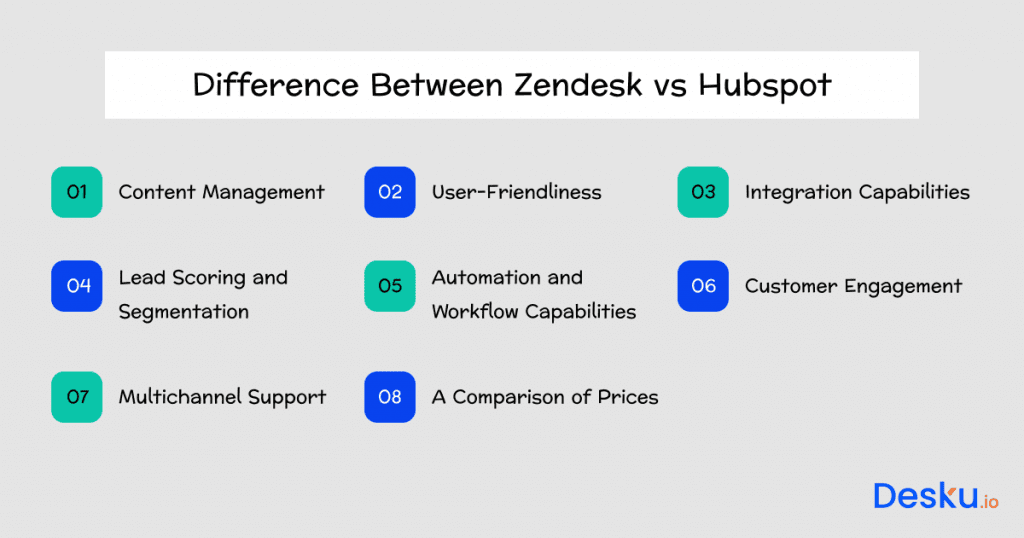
You consider many aspects while choosing customer service software: the project scope, key features, expected outcomes, and budgetary considerations of a project. Nevertheless, the size of your group dictates which characteristics are critical or not relevant.
When to Use Zendesk?
Talking about Zendesk, this is kind of difficult because the product doesn’t focus on a particular organization size or industry. Nevertheless, in terms of quality, Zendesk is perfect for large and small companies that also sell customers abroad.
Everything is on hand, including the multi-language system, which would enable you to give excellent and instantaneous customer assistance as soon as you open your business.
When is it good to opt for Hubspot Service Hub?
With the aim of turning your existing customers into your promoters, HubSpot Service Hub was created. They do not only state this on their website but actually make it happen on the functions level. For those who move units very slowly and would like minimum customer support, for instance, or even above average, then this is the suitable tool!
However, in the case of a larger company, Hubspot may work well for you, but other options exist. In general, the HubSpot Service Hub works best in smaller teams that will be miracles for marketing.
Conclusion
Zendesk and Hubspot have created SaaS platforms for companies ready to take huge leaps in their growth trajectories by seeking automation in the workflow systems, adopting time-efficient practices, and building strong customer relations.
Both the company’s customer support system ensures robust and strategic tools to reduce redundancy in the processes, increase the productivity of the team, and enhance customer experience.
In particular, most of Zendesk’s SaaS solutions target the service and sales sceneries. With its flexible toolkit, companies can create a more continuous experience across all of the touchpoints on the purchase and loyalty journey.
However, Hub Spot targets almost every customer-focused employee where there are tools for website construction, operation management, and improvement in marketing campaigns.
Business leaders desiring to bring order in their marketing, selling, and customer care departments may find a solution with the help of HubSpot’s portfolio. If you’re seeking a better alternative than both, you can go for Desku.
